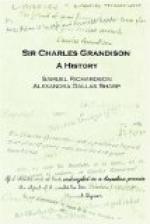You speak, good Mrs. Reeves, said Sir Charles, as if you would join with Dr. Bartlett and me in wishing the establishment of a scheme we have often talked over, though the name of it would make many a lady start. We want to see established in every county, Protestant Nunneries, in which single women of small or no fortunes might live with all manner of freedom, under such regulations as it would be a disgrace for a modest or good woman not to comply with, were she absolutely on her own hands; and to be allowed to quit it whenever they pleased.
Well, brother, said Lady G——, and why could you not have got all this settled a fortnight ago, (you that can carry every point,) and have made poor me a lady abbess?
You are still better provided for, my sister. But let the doctor and me proceed with our scheme. The governesses or matrons of the society I would have to be women of family, of unblamable characters from infancy, and noted equally for their prudence, good-nature, and gentleness of manners. The attendants, for the slighter services, should be the hopeful female children of the honest industrious poor.
Do you not, ladies, imagine, said Dr. Bartlett, that such a society as this, all women of unblemished reputation, employing themselves as each, (consulting her own genius,) at her admission, shall undertake to employ herself, and supported genteelly, some at more, some at less expense to the foundation, according to their circumstances, might become a national good; and particularly a seminary for good wives, and the institution a stand for virtue, in an age given up to luxury, extravagance, and amusements little less than riotous?
How could it be supported? said Lord W——.
Many of the persons, of which each community would consist, would be, I imagine, replied Sir Charles, no expense to it at all; as numbers of young women, joining their small fortunes, might be able, in such a society, to maintain themselves genteelly on their own income; though each, singly in the world, would be distressed. Besides, liberty might be given for wives, in the absence of their husbands, in this maritime country; and for widows, who, on the deaths of theirs, might wish to retire from the noise and hurry of the world, for three, six, or twelve months, more or less; to reside in this well-regulated society. And such persons, we may suppose, would be glad, according to their respective abilities, to be benefactresses to it. No doubt but it would have besides the countenance of the well-disposed of both sexes; since every family in Britain, in their connexions and relations, near or distant, might be benefited by so reputable and useful an institution: to say nothing of the works of the ladies in it, the profits of which perhaps will be thought proper to be carried towards the support of a foundation that so genteelly supports them. Yet I would have a number of hours in each day, for the encouragement of industry, that should be called their own; and what was produced in them, to be solely appropriated to their own use.




